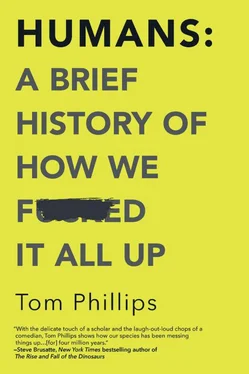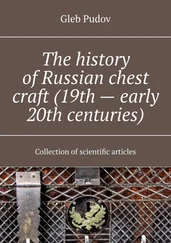Tom Phillips - Humans - A Brief History of How We F*cked It All Up
Здесь есть возможность читать онлайн «Tom Phillips - Humans - A Brief History of How We F*cked It All Up» весь текст электронной книги совершенно бесплатно (целиком полную версию без сокращений). В некоторых случаях можно слушать аудио, скачать через торрент в формате fb2 и присутствует краткое содержание. Город: Toronto, Год выпуска: 2019, ISBN: 2019, Издательство: Hanover Square Press, Жанр: История, Юмористические книги, на английском языке. Описание произведения, (предисловие) а так же отзывы посетителей доступны на портале библиотеки ЛибКат.
- Название:Humans: A Brief History of How We F*cked It All Up
- Автор:
- Издательство:Hanover Square Press
- Жанр:
- Год:2019
- Город:Toronto
- ISBN:978-1-48805-113-5
- Рейтинг книги:4 / 5. Голосов: 1
-
Избранное:Добавить в избранное
- Отзывы:
-
Ваша оценка:
- 80
- 1
- 2
- 3
- 4
- 5
Humans: A Brief History of How We F*cked It All Up: краткое содержание, описание и аннотация
Предлагаем к чтению аннотацию, описание, краткое содержание или предисловие (зависит от того, что написал сам автор книги «Humans: A Brief History of How We F*cked It All Up»). Если вы не нашли необходимую информацию о книге — напишите в комментариях, мы постараемся отыскать её.
Humans: A Brief History of How We F*cked It All Up — читать онлайн бесплатно полную книгу (весь текст) целиком
Ниже представлен текст книги, разбитый по страницам. Система сохранения места последней прочитанной страницы, позволяет с удобством читать онлайн бесплатно книгу «Humans: A Brief History of How We F*cked It All Up», без необходимости каждый раз заново искать на чём Вы остановились. Поставьте закладку, и сможете в любой момент перейти на страницу, на которой закончили чтение.
Интервал:
Закладка:
What we do know is that (as already mentioned) not long after the origin of agriculture, humanity invented inequality. Well done, humans. Archaeologists can tell this by looking at the sizes of houses in early settlements. To begin with, there’s not much difference between them. The societies seem to be fairly egalitarian. But over the first few thousand years after humans began planting crops, an elite starts to emerge who have much larger and fancier houses than everybody else. In the Americas, this rising inequality seems to hit a plateau after about 2,500 years of agriculture; but in the Old World, it just keeps on going up and up. Why? One possible explanation is that the Old World had draft animals like horses and cattle, which could be used for transport and to plow fields, which better enabled the creation of personal wealth that could be passed on down the generations. And thus the 1 percent were born.
At some point, these elites stop just being a bit richer than everybody else, and start actually ruling over them. Spiritual or religious leaders were probably the closest thing the earliest city-states had to rulers, but then something changes around 5,000 years ago in both Egypt and Sumer (modern-day Iraq), and we get the first examples of everybody’s favorite mode of government—absolute dynastic monarchy! There’s a Sumerian stone tablet that very helpfully lists all the kings (and a single solitary queen) in order, which means that it’s possibly a record of the first kings in human history. Unhelpfully, however, a lot of it is clearly bollocks. The first king mentioned on it, Alulim, is recorded as having ruled for 28,800 years, which frankly seems unlikely given that it’d mean he’d still have over 22,000 years of his reign left today.
Why, exactly, does humanity opt again and again for the “put one dude in charge of everything” approach to decision-making? Obviously, they may not have had much choice: the first rulers might have seized power by force, or some other form of coercion. But it also seems likely to be linked to war—the pharaonic dynasty in Egypt begins when Egypt is unified by conquest, and the kings of Sumer emerge during a period of growing intercity conflict. A little while later, in 2334 BCE, after a few hundred years of Sumerian kings, they were conquered by neighboring king Sargon of Akkad, who was busy establishing the world’s first empire. In Mexico, in the valley of Oaxaca, archaeologists can see this all play out in one location. The settlement of San José Mogote starts out as a small, egalitarian, nonhierarchical village shortly after the adoption of agriculture around 3,600 years ago. Over the next millennium or so, minor conflicts with neighboring villages escalate, and wealth and inequality increase, until by 2,400 years ago it’s being ruled as a chiefdom, the valley is falling into a state of war and the population of San José Mogote has moved up a mountain and started building a defensive wall.
“Which came first, the leaders or the wars?” is a bit of a chicken-and-egg question, but the two certainly seem to go hand in hand—and unfortunately for everybody else, it’s not something you can really opt out of if you’d rather stay as a small, egalitarian village. In good news for fans of war, we’ll have more on war in a couple of chapters, but for now let’s focus on the leaders.
I know it’s hard to believe in our fortunate, enlightened times, but occasionally the people who become the leaders of countries aren’t actually terribly well suited to the job. In fact, it’s actually not that surprising: you probably have to be at least a bit weird to start with to even want to run a country. Some of us have enough trouble choosing what socks to wear in the morning—imagine actually wanting to choose what socks a whole nation should wear?
Of course, there are lots of different types of leaders, and plenty of ways that countries can end up stuck with them. You’ve got your different flavors of autocrat: the hereditary dynasties, the ruling by divine right, the seizing of power by force and various types of dictator. Oh, and you’ve also got democratic elections. We’ll take a quick spin through the screw-ups of democracy in the next chapter; in this chapter, we’ll take a look at some of history’s most incompetent, awful and just plain weird autocrats.
Let’s start with Qin Shi Huang, the first emperor of China, a man who shaped our modern world to a quite staggering degree through his combination of a farsighted vision and a brutal but effective approach to getting things done. Unfortunately for him, he also blew it with a classic bit of delusional supervillain-style overreach.
Qin united the seven warring kingdoms of China into a single country through the cunning diplomatic tactic of conquering all of them. Nobody had ever managed this before: in 222 BCE, at a time when Rome was only just beginning to ponder properly expanding beyond Italy and getting itself an empire, Qin was founding a vast political entity that would outlast them all.
Not only did he manage that, but he did so while instituting a series of reforms that would set standards for how a modern country should be organized: reducing the influence of feudal lords and establishing a centralized bureaucracy, standardizing writing, money and measurement systems and building key communications infrastructures such as a huge network of roads and an early mail service. Oh, and he started work constructing the first sections of what would become the Great Wall.
So… what’s so wrong with Qin, then? Well, unfortunately, he did all this by suppressing all opposition, banning opposing philosophies, executing people who disagreed with him and violently forcing peasants into slavery for his construction projects. That probably doesn’t come as much of a surprise, given how things in history tend to play out.
What is a bit more surprising is what he used all his unprecedented centralized power and widespread communication networks for: in short, to make his subjects hunt for the elixir of life.
Qin, being an ambitious sort, was obsessed with immortality, and was convinced that by unleashing the power of his new state he could brute-force his way to finding the secret of everlasting life. He sent out demands across the nation, roping in everybody from doctors to soldiers to tradesmen in the most remote parts of the country to contribute to his search. He ran his personal quest like a major government initiative, with his central court receiving regular progress reports from various outposts, and samples of herbs and potions being sent for his consideration. As part of it, all doctors had to register with the state. In some ways, it was an early form of centralized health system. In other ways, it really wasn’t.
Sadly for Qin, it didn’t work out as a great health system from his point of view. In true supervillain form, his search for immortality was his downfall: it’s believed that many of the would-be elixirs of life he sampled contained mercury. Which, naturally, killed him. (And quite probably drove him mad from mercury poisoning before he died, which obviously is exactly what you want in a power-hungry absolutist ruler whose every word is law.)
By the time he died, everybody was so pissed off with Qin that they revolted almost immediately after he left the stage, overthrowing his heir a few years after his death. Qin’s dynasty didn’t last, even if the country he founded is a superpower to this day. They never did find the secret of everlasting life, though.
Sticking with China, but fast-forwarding about 17 centuries to 1505, if you want a helpful guide on why it’s best not to put someone with the temperament of a spoiled child in charge of a country, then the Zhengde Emperor (born Zhu Houzhao) is probably a pretty good place to start.
Читать дальшеИнтервал:
Закладка:
Похожие книги на «Humans: A Brief History of How We F*cked It All Up»
Представляем Вашему вниманию похожие книги на «Humans: A Brief History of How We F*cked It All Up» списком для выбора. Мы отобрали схожую по названию и смыслу литературу в надежде предоставить читателям больше вариантов отыскать новые, интересные, ещё непрочитанные произведения.
Обсуждение, отзывы о книге «Humans: A Brief History of How We F*cked It All Up» и просто собственные мнения читателей. Оставьте ваши комментарии, напишите, что Вы думаете о произведении, его смысле или главных героях. Укажите что конкретно понравилось, а что нет, и почему Вы так считаете.












